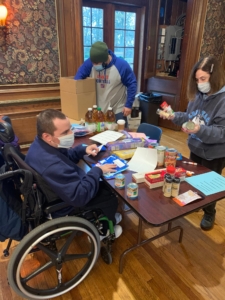That’s Amore: Volunteers With Disabilities Address Food Insecurity Through Pasta Kits
In honor of National Volunteer Month, The Arc is highlighting the efforts of volunteers with disabilities. While these individuals are serving their neighbors, they are also a living example of the tremendous value they bring to their communities.

The staff and clients at AHRC Nassau know the value of a home cooked meal – and the comfort and joy it brings to a family. For their 2022 MLK Day of Service event, they wanted to extend that joy while offering tangible food assistance to their community in
Brookville, New York. They decided to create, pack, and deliver pasta meal kits to their neighbors experiencing food insecurity. Volunteers were empowered by learning what ingredients and steps were needed to cook a delicious meal. They also helped to show that people with disabilities are not always the ones in need of service and can give back to their communities as well.
Twenty volunteers with disabilities directed each phase of the process, from finding all the ingredients to setting up the event in January. Some of AHRC Nassau’s clients created hand-written cards celebrating the spirit of the initiative. Others designed artwork, each piece inscribed with a quote from Dr. Martin Luther King Jr.: “Only in the darkness can you see the stars.” These items were placed in the meal kits alongside the ingredients.
 As the big day arrived, volunteers with disabilities again led the way, including Nijah, who oversaw setup. Others prepared the boxes, packed the meal kits, and completed quality inspection. Once all boxes were packed and ready for distribution, the group delivered 100 meal kits to Island Harvest, Long Island’s food bank. In total, 400 individuals were served that day.
As the big day arrived, volunteers with disabilities again led the way, including Nijah, who oversaw setup. Others prepared the boxes, packed the meal kits, and completed quality inspection. Once all boxes were packed and ready for distribution, the group delivered 100 meal kits to Island Harvest, Long Island’s food bank. In total, 400 individuals were served that day.
Long Islanders facing hunger weren’t the only beneficiaries of the day. Each volunteer shared a collective sense of accomplishment in combatting food insecurity in their backyard. More importantly, the volunteers with disabilities felt pride that they have demonstrated that everyone plays a critical role in making their community more equitable for all—showing the true meaning of the quote from King that “Everybody can be great…because anybody can serve.”
Want to learn how to engage volunteers with disabilities? The Arc’s tip sheet Planning for Including People with Intellectual Disabilities in Volunteer Programs can help your organization get started.









